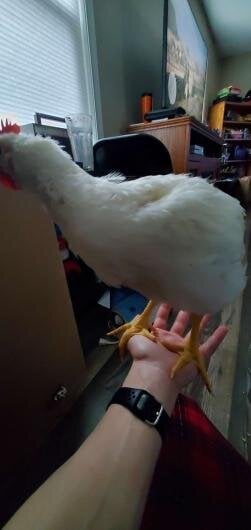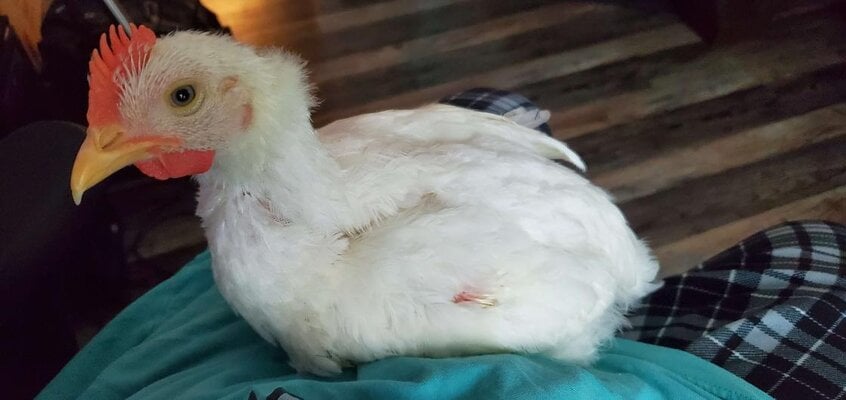Plushness
Chirping
- Mar 28, 2023
- 32
- 82
- 59
I have read some forum posts related to this topic, though I'm interested to get an answer for my current situation. I recently made a new feeder, one that is made of cardboard as I found it easier to craft my own than to just buy one. The design I came up with is a trough system, on one side they have grit and the other for their feed. The reason why I have one side grit while the other is feed, the grit helps weighing it down as to not have it toppled over, my larger Cornish Cross tends to destroy my cardboard creations lol.
They used to have a feeder from when they were chicks, then my flock of 4 grew up to now their 8th week! \(๑•́o•̀๑)/
With them being Cornish Cross, they do get big rather quickly and started to feed from the top down, where the lid used to go, than the holes at the bottom. I notice my pullet likes to lay down and eat from those holes, but my 3 other cockerels often times eat from the top. This ultimately can cause them to knock over the feeder, though it isn't as often anymore thanks to them getting so big and tall. They also seem to prefer their old way of getting grit, which I just put it on a plate inside their coop.
My current idea is to just take away their old feeder and eventually they will have no choice to use my new trough feeder. However, I just noticed they're foraging around the substrate at the very place where their old feeder used to be. They'll eat up scraps of what was left on the floor, despite them having a pretty large trough for them to eat out of. Here and there, before I took their old feeder, I do notice a couple of my chickens will eat at the feed and grit from their new feeder.
I have started my current idea, taking away old feeder, from last night. So it hasn't even been a full day yet, but I do get worried my chickens may starve because of this new change. Speaking of new change, I have their feeder outside the coop as to schedule their feed a bit where they don't eat, but have access to water, throughout the night and can eat during the day. Should I be concerned with my current plan or should I try something else? Do you have any tips and tricks of your own to help with the new change?
They used to have a feeder from when they were chicks, then my flock of 4 grew up to now their 8th week! \(๑•́o•̀๑)/
With them being Cornish Cross, they do get big rather quickly and started to feed from the top down, where the lid used to go, than the holes at the bottom. I notice my pullet likes to lay down and eat from those holes, but my 3 other cockerels often times eat from the top. This ultimately can cause them to knock over the feeder, though it isn't as often anymore thanks to them getting so big and tall. They also seem to prefer their old way of getting grit, which I just put it on a plate inside their coop.
My current idea is to just take away their old feeder and eventually they will have no choice to use my new trough feeder. However, I just noticed they're foraging around the substrate at the very place where their old feeder used to be. They'll eat up scraps of what was left on the floor, despite them having a pretty large trough for them to eat out of. Here and there, before I took their old feeder, I do notice a couple of my chickens will eat at the feed and grit from their new feeder.
I have started my current idea, taking away old feeder, from last night. So it hasn't even been a full day yet, but I do get worried my chickens may starve because of this new change. Speaking of new change, I have their feeder outside the coop as to schedule their feed a bit where they don't eat, but have access to water, throughout the night and can eat during the day. Should I be concerned with my current plan or should I try something else? Do you have any tips and tricks of your own to help with the new change?





